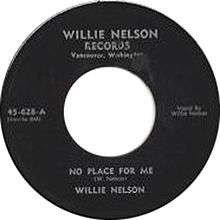No Place For Me
| "No Place for Me" | |||||||
|---|---|---|---|---|---|---|---|
 | |||||||
| Single by Willie Nelson | |||||||
| B-side | "Lumberjack" | ||||||
| Released | February 1957 | ||||||
| Format | 7" single | ||||||
| Genre | Country | ||||||
| Length | 1:18 | ||||||
| Label | Willie Nelson Records | ||||||
| Writer(s) | Willie Nelson | ||||||
| Willie Nelson singles chronology | |||||||
| |||||||
| |||||||
"No Place for Me" was the debut recording song of country singer-songwriter Willie Nelson. Nelson recorded the song while working as a disk jockey at KVAN in Vancouver, Washington, using a studio of the radio. Through a DJ he met during his time working on the radio in Texas, he contacted Starday Records, sending the tapes over to the label.
Starday Records pressed for Nelson 500 copies of the single, issued under the custom label "Willie Nelson Records". The company initially reserved the rights for re-publications under the Starday label, but decided later not to exercise the right. Nelson sold the record over his radio show The Western Express, a final total of 3,000 units.
Background
After working in different radio stations as a disk jockey in Texas, Willie Nelson moved to Portland, Oregon in 1956. Nelson was soon hired by KVAN, where he hosted the hour-long show The Western Express. He soon gained popularity on the area, making public appearances singing in Vancouver clubs, and in other local events. Nelson's show was soon upgraded, hosting by 1957 a three-hour long show, and becoming one of the most listened radio personalities in the Portland-Vancouver area.
Recording and release
Taking advantage of his local popularity, Nelson decided that it was time to record his debut single. He chose, for the main side his original "No Place for Me". bringing local steel guitarist Buddy Fite to back him.[1] Nelson played his own guitar on the recording in a boom-chicka-boom style, totaling a length of 78 seconds.[2] He included on the flipside for commercial porpuoses Leon Payne's "Lumberjack", which took place in the state of Oregon. Nelson recorded both songs on a studio of the radio with the available equipment.[1]
During his time working on the radio in Texas, Nelson met D.J T. Texas Tyler. He called Tyler to ask for his help to press the records. Tyler called his acquittance Don Pierce, who worked in Pappy Daily's Starday Records.[3] Nelson mailed the tapes to Starday, that pressed 500 recordings under the custom "Willie Nelson Label". Nelson paid for the records, agreeing to Starday's policy of reserving the rights of the tracks for further releases on the Starday label or for the label to act as a publisher of the song.[4]
Ultimately, Starday decided not to exercise the right, since neither Pierce or Daily felt that the songs had the potential for a label release.[3] Nelson sold the records on-air during his show in February 1957, offering them for US$1, with the addition of an 8x10 autographed photograph. The single totaled sales for 3,000 copies.[5][4]
Footnotes
- 1 2 Patoski, Joe Nick 2008, p. 77.
- ↑ Thomson, Graeme 2012, p. 44.
- 1 2 Gibson, Nathan 2011, p. 64.
- 1 2 Patoski, Joe Nick 2008, p. 78.
- ↑ Thomson, Graeme 2012, p. 45.
References
- Gibson, Nathan (2011). The Starday Story: The House that Country Music Built. Univ. Press of Mississippi. ISBN 978-1-604-73831-5.
- Patoski, Joe Nick (2008). Willie Nelson: An Epic Life. Hachette Digital. ISBN 978-0-316-01778-7.
- Thomson, Graeme (2012). Willie Nelson: The Outlaw. Virgin Books. ISBN 978-0-75351-184-8.